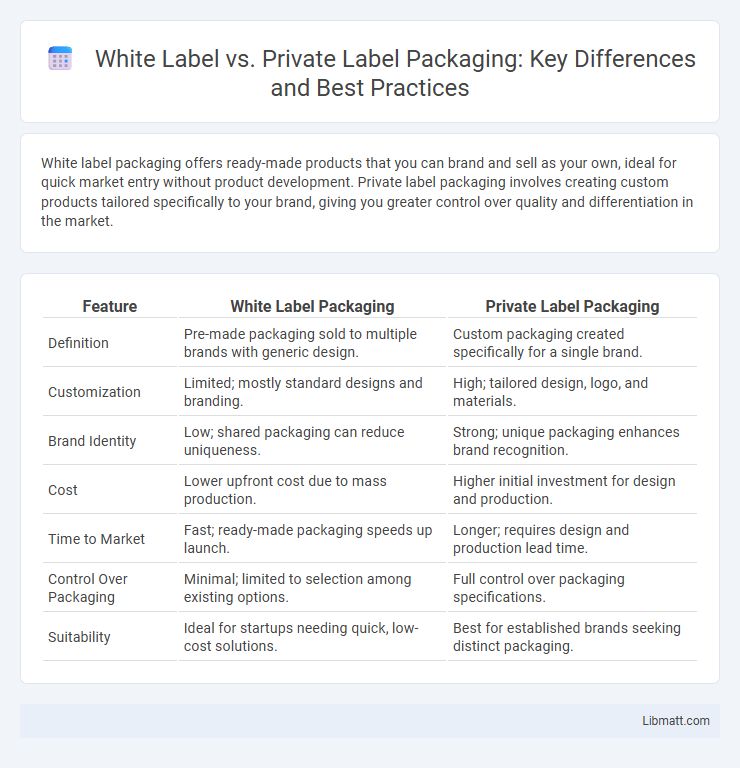White label packaging offers ready-made products that you can brand and sell as your own, ideal for quick market entry without product development. Private label packaging involves creating custom products tailored specifically to your brand, giving you greater control over quality and differentiation in the market.
Table of Comparison
| Feature | White Label Packaging | Private Label Packaging |
|---|---|---|
| Definition | Pre-made packaging sold to multiple brands with generic design. | Custom packaging created specifically for a single brand. |
| Customization | Limited; mostly standard designs and branding. | High; tailored design, logo, and materials. |
| Brand Identity | Low; shared packaging can reduce uniqueness. | Strong; unique packaging enhances brand recognition. |
| Cost | Lower upfront cost due to mass production. | Higher initial investment for design and production. |
| Time to Market | Fast; ready-made packaging speeds up launch. | Longer; requires design and production lead time. |
| Control Over Packaging | Minimal; limited to selection among existing options. | Full control over packaging specifications. |
| Suitability | Ideal for startups needing quick, low-cost solutions. | Best for established brands seeking distinct packaging. |
Introduction to White Label and Private Label Packaging
White label packaging involves pre-designed products that multiple companies can rebrand and sell as their own, providing a cost-effective solution for businesses entering the market quickly. Private label packaging, however, is custom-designed exclusively for your brand, allowing greater control over product uniqueness and brand identity. Choosing between white label and private label packaging depends on your need for customization, speed to market, and brand differentiation.
Defining White Label Packaging
White label packaging refers to pre-designed packaging products created by manufacturers that retailers can rebrand and sell under their own label without modification. This packaging solution enables businesses to quickly enter the market with ready-made designs while maintaining brand identity through custom labeling. White label packaging is ideal for companies seeking cost-effective, scalable options without investing in unique packaging development.
Understanding Private Label Packaging
Private label packaging involves customizing products with a retailer's branding while the manufacturer handles production, allowing businesses to maintain control over design and quality. This packaging strategy enables companies to offer unique products without investing in manufacturing infrastructure. Understanding private label packaging helps brands differentiate themselves by tailoring packaging to target markets, fostering brand loyalty and enhancing shelf appeal.
Key Differences Between White Label and Private Label
White label packaging involves selling generic products under multiple retailers' brands, allowing businesses to quickly enter the market without product customization. Private label packaging offers exclusive branding and product customization tailored to Your specifications, providing greater control over product quality and design. The key differences lie in ownership, customization options, and exclusivity, with private labeling granting unique product identity and white labeling focusing on shared, non-exclusive products.
Pros and Cons of White Label Packaging
White label packaging offers advantages such as reduced time-to-market and lower production costs by using pre-designed products, making it ideal for businesses seeking quick entry with minimal investment. However, limitations include less brand differentiation and restricted customization options, potentially impacting market uniqueness. The ease of scaling and ready-made product support are balanced by challenges in establishing a distinct brand identity and dependency on the supplier's quality control.
Pros and Cons of Private Label Packaging
Private label packaging offers the advantage of complete control over branding and customization, allowing your products to stand out uniquely in the market. However, it often requires higher upfront investment and longer production timelines compared to white label options. The trade-off involves balancing exclusivity and brand identity with cost efficiency and speed to market.
Cost Comparison: White Label vs Private Label Packaging
White label packaging typically involves lower upfront costs since products and packaging designs are pre-made and sold to multiple retailers, reducing expenses associated with design and manufacturing. Private label packaging requires a higher initial investment due to custom branding, unique packaging designs, and exclusive production runs, which can increase costs but offer greater brand differentiation. Evaluating the balance between lower costs with white label options and the premium pricing of private label solutions depends on the desired level of brand control and market positioning.
Branding Opportunities with White Label and Private Label
White label packaging allows multiple companies to sell identical products under their own brand, offering limited customization options but faster market entry. Private label packaging provides exclusive branding control, enabling you to tailor design, logo, and packaging materials to create a unique brand identity. Your choice impacts how distinctively your product stands out and connects with customers in competitive markets.
Which Packaging Solution Fits Your Business?
White label packaging offers ready-made, customizable designs ideal for businesses seeking quick market entry and lower upfront costs, while private label packaging provides fully bespoke solutions tailored to unique brand identities, supporting long-term brand differentiation. Small to mid-sized companies might prefer white label for speed and cost efficiency, whereas larger enterprises benefit from private label for exclusive packaging that enhances brand value and customer loyalty. Evaluating product type, budget constraints, and branding goals ensures the most suitable packaging strategy aligns with business growth and competitive positioning.
Final Thoughts: Choosing Between White Label and Private Label Packaging
Choosing between white label and private label packaging depends on your brand's control and customization needs. White label packaging offers a ready-made solution for quick market entry, while private label packaging provides unique branding opportunities tailored to your product. Your decision should balance speed, cost, and brand differentiation to align with your business goals.
White label vs private label packaging Infographic

 libmatt.com
libmatt.com